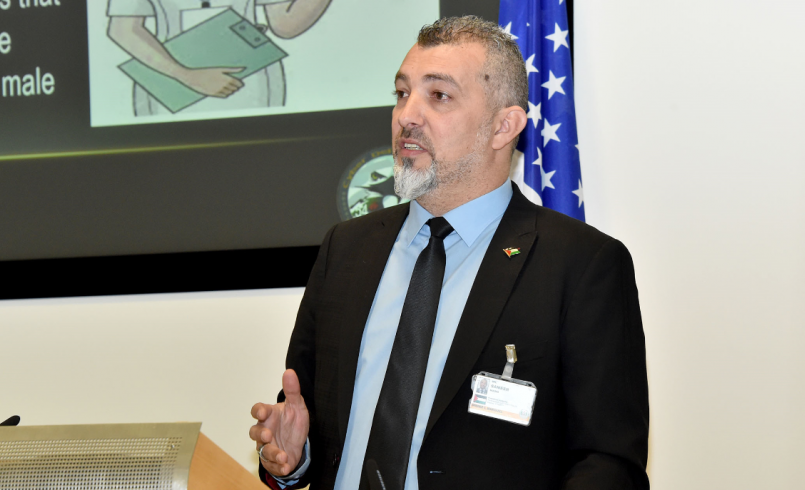- George C. Marshall European Center for Security...
- PTSS: Program on Terrorism and Security Studies
- Global Counterterrorism Workshop Builds the Tea...
Global Counterterrorism Workshop Builds the Team, Explores Increasing Role of Women
sameer.png

By Christine June
GCMC Public Affairs
GARMISCH-PARTENKIRCHEN, Germany (Jan. 12, 2017) – Getting his point across to 69 fellow counterterrorism practitioners from 44 countries, Lt. Col. Sameer Marouf Masri told the real-life account of one of his female security officers, who ran an 18-month operation in five countries, tracking a lone-wolf terrorist from ISIS, which resulted in his capture and six others.
“She came to me with this mission, which was continuous and very complicated. She is a dedicated wife and mother of four children…and, she was very successful,” said Masri, director of the Counter Cyber Terror Department of the Palestinian Authority, during his presentation. “So you see, it is possible to have women, not only involved in countering terrorism and violent extremism, but also in charge of operations.”
He was member of the panel on “How Women Prevent Terrorism and Violent Extremism” held Jan. 11, as part of the Global Counterterrorism Alumni Community of Interest Workshop.
Held Jan. 10 to 12, this workshop brought together and engaged a select group from more than 1,600 alumni of the Marshall Center’s premier Program on Terrorism and Security Studies to discuss how women can enhance a nations’ counterterrorism capabilities.
“The role of women in counterterrorism is an important and under-explored topic,” said U.S. Army Lt. Gen. (Ret.) Keith Dayton, the Marshall Center director, as he welcomed back alumni on the first day of the workshop. “Everyone acknowledges that we need to make use of the under-utilized skills and talents of the female half of our populations, but there is little out there about precisely how to do it.”
This workshop provided the atmosphere to gather best practices on how other countries engage women and benefit from their power, influence and reach in societies to combat terrorism and violent extremism.
“I think one of the greatest advantages of the way we have these communities of interest workshops put together is that we actually bring back alumni who are graduates of the program and who are actually increasing women’s role in their countries,” said Jim Howcroft, PTSS director. “We had people from around the world coming back to talk very specifically and very concretely about how they are increasing the role of women in Palestine, Norway, Nigeria, Bangladesh and Pakistan.
“Alumni are talking to their peers about real concrete solutions,” said Howcroft.
Masri was one of seven alumni who presented on topics such as how women address root causes and reduce vulnerabilities to terrorism, and roles of women leaders in counterterrorism.
“I could see on the first day of this workshop, how important this topic is for all of us,” said Elisabeth Rise, deputy police chief of the National Police Directorate in Norway. “All of us in our countries struggle with taking the second step. Women receive education. Women learn, and try to take an active part in society and the professional environment, but at some point, it stops. If it is the glass ceiling or family and children or if it is gender issues, the number of women in leadership roles are low and actually, going down quite a lot...also, in Norway, which is interesting. It’s the same problems.”
She said that many ideas, solutions and best practices came up doing this workshop such as the linking policies to United Nations’ resolutions, using research and gaining the focus of politicians on the issue of increasing women’s roles throughout societies, including fighting terrorism.
At the end of the workshop, six attendees representing their seminars participated in a round-robin panel discussion where they listed recommendations on how to increasing women’s role in counterterrorism to the PTSS leadership. They came up with close to 40 ideas that the PTSS leadership will compile and present to other alumni, stakeholders and the public.
Attendees are encouraged to think about and implement the recommendations and best practices that come out of workshops like this one in their countries.
Masri said that is exactly what he did.
“The model that I presented at this workshop was a model that I learned from a Marshall Center workshop in 2012, a year after I was assigned as the cyber director,” he said. “I added more women roles in this model that targets how terrorists recruit.
“When I started working at Counter Cyber Terror Department in 2011, I had one lady on my team. I now have 27 ladies, and 11 are managers,” he said.
“Oh,” he added, “My deputy is a lady.”
Link to CT-COI video spot HERE.

